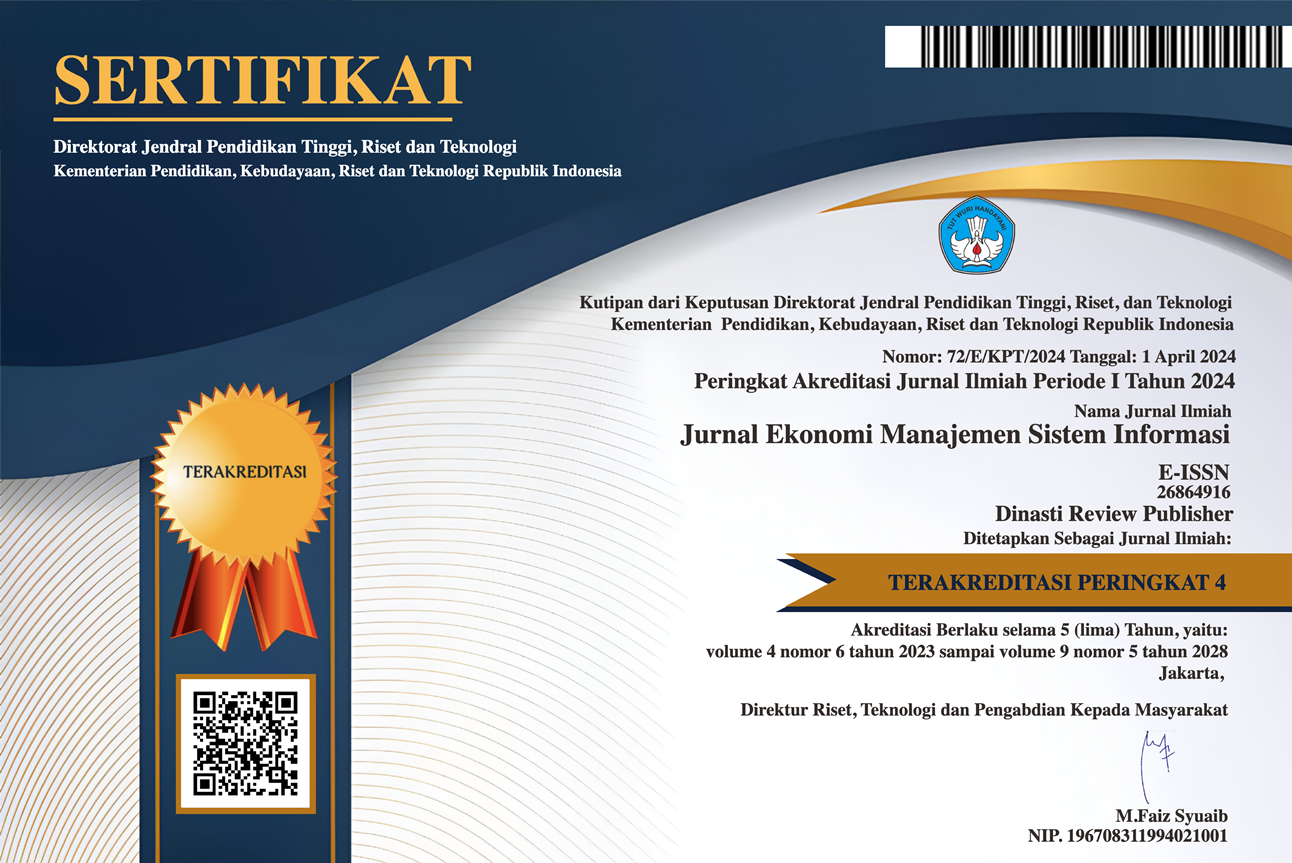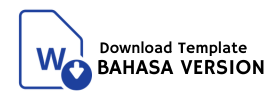PENGARUH TATA KELOLA DAN KOMPETENSI TERHADAP KINERJA ORGANISASI DIMEDIASI PERILAKU INOVATIF PADA BADAN USAHA MILIK DESA (BUM DESA) DALAM WILAYAH KABUPATEN TANJUNG JABUNG BARAT
DOI:
https://doi.org/10.31933/jemsi.v3i6.1099Keywords:
Tata Kelola, Kompetensi, Perilaku Inovatif, KinerjaAbstract
Penelitian ini bertujuan untuk mengatahui gambaran tata Kelola, kompetensi, perilaku Inovatif dan kinerja BUMdesa yang ada di Kabupaten Tanjung Jabung Barat; serta untuk menganalisis pengaruh tata kelola dan kompetensi terhadap kinerja BUMdesa yang ada di Kabupaten Tanjung Jabung Barat baik secara langsung maupun tidak langsung melalui perilaku inovatif sebagai variable intervening. Populasi dalam penelitian ini adalah seluruh organisasi BUMdes yang ada di Kabupaten Tanjung Jabung Barat dengan jumlah 114 BUMDesa. Ukuran sampel dalam penelitian ini menggunakan nonprobability sampling dengan teknik purposive sampling. Dimana sampel yang digunakan dalam penelitian ini memenuhi beberapa kriteria yang telah di tentukan, sehingga diperoleh sampel sebanyak 50 BUMDesa. Penelitian ini menggunakan pendekatan kuantitatif dengan metode survey dan menggunakan analisis data Partial Least Square (PLS). Namun sebelum analisis, terlebih dahulu dilakukan uji outer model melalui uji validitas dan reliabilitas. Selanjutnya melakukan uji Inner Model melalui uji R-Square (Coefficient of determination), dan F-Square (f2 effect size). Hasil penelitian ini menyimpulkan bahwa tata kelola dan kompetensi memiliki pengaruh yang positif dan signifikan terhadap kinerja BUMdesa, baik secara langsung maupun tidak langsung melalui perilaku inovatif sebagai variable intervening. Hal ini menjelaskan bahwa semakin baiknya tata kelola dan kompetensi yang dimiliki oleh pengurus BUMDesa, akan berpengaruh terhadap perilaku inovatif pengurus dalam mengelola BUMDesa, yang berdampak dengan semakin baiknya kinerja Badan Usaha Milik Desa.
References
Antony, J. P., & Bhattacharyya, S. (2010). Measuring organizational performance and organizational excellence of SMEs - Part 2: An empirical study on SMEs in India. Measuring Business Excellence, 14(3), 42–52. https://doi.org/10.1108/13683041011074209
Ball,A.S dan Ball,A.S (2016) Social enterprice governance. Journal of Business Low, 18 (4), 919-984
Birdi, K., Leach, D & Magadley, W. (2016). The relationship of individual capabilities and environmental support with different facets of designers' innovative behavior. Journal Product Innovative Management. 33 (1), 19– 35.
Child, J., & Rodrigues, S. B. (2004). Repairing the breach of trust in corporate governance. Corporate Governance: An International Review, 12(2), 143–152
De Jong, J. P. J., & Den Hartog, D. N. (2007). How leaders influence employees’ innovative behaviour. European Journal of Innovation Management, 10(1), 41–64
Elbaz, A. M., Haddoud, M. Y., & Shehawy, Y. M. (2018). Nepotism, employees’ competencies and firm performance in the tourism sector: a dual multivariate and qualitative comparative analysis approach. Tourism Management, 67, 3-16.
Ghozali, I., & Latan, H. (2015). Partial Least Squares : Konsep, Teknik dan Aplikasi Smart PLS 3.0 untuk Penelitian Empiris. In Universitas Diponegoro.
Hair, J. F., Risher, J. J., Sarstedt, M., & Ringle, C. M. (2017). When to use and how to report the results of PLS-SEM. European Business Review, 31(1), 2-24.
Janssen, O. (2000). Job Demands, Perceptions of Effort–Reward Fairness and Innovative Work Behaviour. Journal of Occupational and Organizational Psychology. Vol. 73: 287–302.
Mangkunegara, A.P. (2005). Evaluasi Kinerja Sumber Daya Manusia, edisi pertama, cetakan pertama. Bandung: Refika Aditama.
Nguyen, P. T., Yandi, A., & Mahaputra, M. R. (2020). Factors That Influence Employee Performance: Motivation, Leadership, Environment, Culture Organization, Work Achievement, Competence and Compensation (a Study of Human Resource Management Literature Studies). Dinasti International Journal of Digital Business Management.
Otoo, F. N. K. (2019). Human resource development (HRD) practices and banking industry effectiveness: The mediating role of employee competencies. European Journal of Training and Development.
Olys Harun, Ikhfan Haris, Novianty Djafr. (2021). Pengaruh Pengalaman Kerja Guru, Iklim Kerja dan Kompetensi Profesional Guru terhadap Perilaku Inovatif di Sekolah Menengah Kejuruan Negeri Se Kabupaten Pohuwoto. Jurnal Pendidikan Normalita Vol. 9 No.3.
Peraturan Pemerintah Nomor 11 taahun 2021 tentang Badan Usaha Milik Desa.
Potnuru, R.K.G & Sahoo, C.K. (2016). HRD Interventions, employee competencies and organizational effectiveness ; an empiric study, European Journal of Training and Development, 40 (5), 345-365. https:/doi.org/10.1108/EJTD-02-2016-0008
Purnomo, J. (2016). Pendirian dan pengelolaan Badan Usaha Milik Desa (BUMDes). Yogyakarta: Infest
Sajjad Nawaz Khan, et al. (2019). The mediating role of innovation between corporate governance and organizational performance: Moderating role of innovative culture in Pakistan textile sector. Cogent Business & Management, 6:https://doi.org/10.1080/23311975.2019.1631018
Salman, M., Ganie, S. A., & Saleem, I. (2020). Employee Competencies as Predictors of Organizational Performance: A Study of Public and Private Sector Banks. Management and Labour Studies, 45(4), 416-432
Sofyani, Hafiez, dkk. (2020). Implementasi Prinsip-Prinsip Tata Kelola Yang Baik dan Perannya Terhadap Kinerja di Badan Usaha Milik Desa (BUMDes). Jurnal Ilmiah Akuntansi, Vol. 5 No 2, Hal L325-359
Sujarweni, V. Wiratna. (2014). Metode Penelitian: Lengkap, Praktis, dan Mudah Dipahami. Yogyakarta: Pustaka Baru Press.
Sugiyono. (2016). Metode Penelitian Kuantitatif, Kualitatif dan R&D. Bandung: PT Alfabet
Spencer, M. Lyle & Spencer, M. Signe. (1993). Competence at Work., Canada: John Wiley & Sons, Inc.
Tseng, S. M., & Lee, P. S. (2014). The effect of knowledge management capability and dynamic capability on organizational performance. Journal of Enterprise Information Management, 27(2), 158–179. https://doi.org/10.1108/JEIM-05-2012-0025
Undang-Undang Republik Indonesia Nomor 6 Tahun 2014 Tentang Desa
Voss, G. B., & Voss, Z. G. (2000). Strategic orientation and firm performance in an artistic environment. Journal of Marketing, 64(1), 67–83. https://doi.org/10.1509/jmkg.64.1.67.17993
Woo-Sung Choi , Seung-Wan Kang, and Suk Bong Choi. (2021). Innovative Behavior in the Workplace: An Empirical Study of Moderated Mediation Model of Self-Efficacy, Perceived Organizational Support, and Leader–Member Exchange, Journal Behav. Sci. 11, 182. https://doi.org/10.3390/bs11120182
Downloads
Published
How to Cite
Issue
Section
License
Hak cipta :
Penulis yang mempublikasikan manuskripnya di jurnal ini menyetujui ketentuan berikut:
- Hak cipta pada setiap artikel adalah milik penulis.
- Penulis mengakui bahwa Jurnal Ekonomi Manajemen Sistem Informasi (JEMSI) berhak menjadi yang pertama menerbitkan dengan lisensi Creative Commons Attribution 4.0 International (Attribution 4.0 International CC BY 4.0) .
- Penulis dapat mengirimkan artikel secara terpisah, mengatur distribusi non-eksklusif manuskrip yang telah diterbitkan dalam jurnal ini ke versi lain (misalnya, dikirim ke repositori institusi penulis, publikasi ke dalam buku, dll.), dengan mengakui bahwa manuskrip telah diterbitkan pertama kali di Jurnal Ekonomi Manajemen Sistem Informasi (JEMSI).










































































